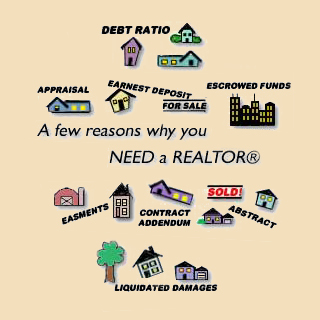

Steps to Buying a Home
Find the Right Real Estate Agent
Real estate agents are important partners when you’re buying a home. An Executive agent can provide you with helpful information on homes and neighborhoods that isn’t easily accessible to the public. Our detailed knowledge of the home buying process, negotiating skills, and familiarity with the area in which you want to live can be extremely valuable. Best of all, it doesn’t cost you anything to use an agent – we’re compensated from the commission paid by the seller of the house.
Determine How Much House You Can Afford
Lenders generally recommend that people look for homes that cost no more than three to five times their annual household income if the home buyers plan to make a 20% down payment and have a moderate amount of other debt. You should make this determination based on your own financial situation.
Get Prequalified and Preapproved for credit for Your Mortgage
Before you start looking for a home, you will need to know how much you can actually spend. The best way to do this is to get prequalified for a mortgage. You will need to provide some financial information to your mortgage banker, such as your income and the amount of savings and investments you have, as well as debts you already have. Your lender will review this information and tell you how much you can borrow. This gives you the price range of the homes you should be looking at. You can also get preapproved for credit, which involves providing your financial documents (W-2 statements, paycheck stubs, bank account statements, etc.) so your lender can verify your financial status and credit.
Shop for Your Home and Make an Offer
Start touring homes in your price range. It might be helpful to take notes on all the homes you visit since it can be hard to remember everything about them; you might even want to take pictures or video to help you remember each home. It’s also important to evaluate the neighborhood and make a note of things such as: Are the other homes on the block well maintained? How much traffic does the street get? Is it conveniently located near places of interest to you; schools, shopping centers, restaurants or parks?
Take the time you need to find the right home. Your Executive agent will then negotiate a fair offer based on the value of comparable homes in the same neighborhood. Once you and the seller have reached agreement on a price & terms, the detailed work begins. During this period of time you will complete all the remaining steps in the home buying process.
Get a Home Inspection
Typically, purchase offers are contingent on a home inspection of the property to check for signs of structural damage or things that may need fixing. Your Executive agent will help you arrange to have this inspection conducted within a few days of your offer being accepted by the seller. This contingency protects you by giving you a chance to renegotiate your offer or withdraw it without penalty if the inspection reveals significant material damage. Before the sale closes, you will have a walk-through of the house, which gives you the chance to confirm that any agreed-upon repairs have been made.
Have the House Appraised
Lenders will arrange for an appraiser to provide an independent estimate of the value of the house you are buying. The appraiser is a member of a third party company and is not directly associated with the lender. The appraisal will let all involved know that you are paying a fair price for the house.
Coordinate the Paperwork
As you can imagine, there is a lot of paperwork involved in buying a house. Your Executive agent will arrange for a title company to handle all of the paperwork and will also help make sure that the seller’s paperwork is in order.
Close the Sale
You will complete your pre-closing walk-through with your Executive agent. At closing, you will sign all of the paperwork required to complete the purchase, including your loan documents. You will wait while your loan is cleared to be funded after the paperwork is returned to the lender. Once the check is delivered to the seller, you are ready to move into your new home according to the terms of your contract!